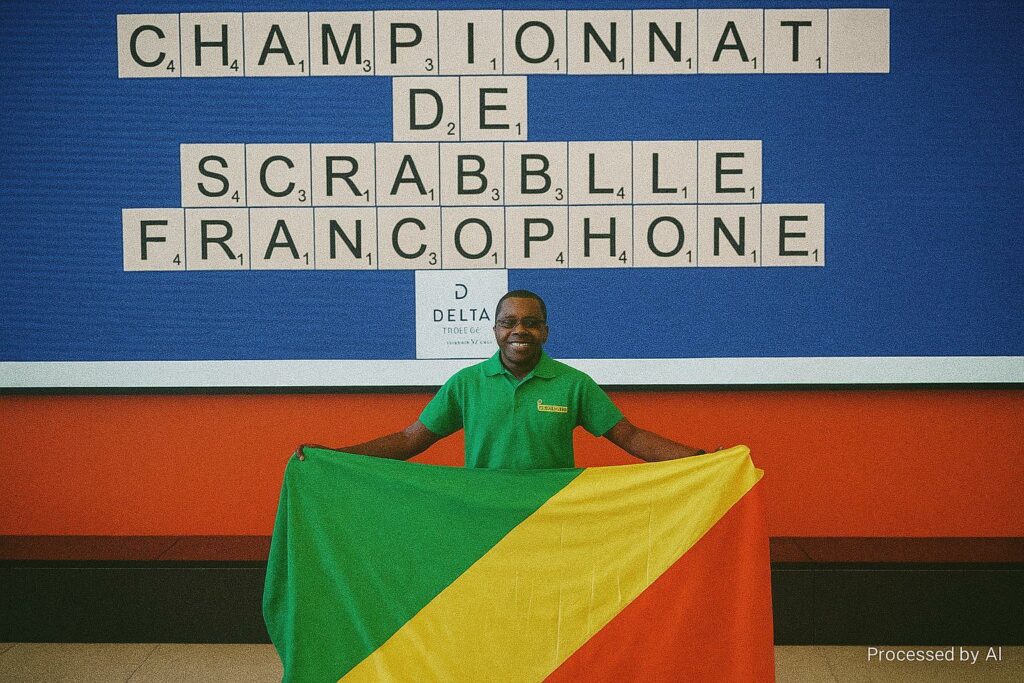Soft power through lexical excellence
In an era where national influence is wielded as much through cultural capital as through economic weight, the Republic of Congo has found an unlikely envoy in a seventeen-year-old lycée student. Briny Oscar Kouba Matouridi, hailing from Brazzaville’s modest Bacongo district, captured the gold medal in the Tournoi Homologué 3 of the 53rd Francophone World Cup held in Trois-Rivières between 10 and 18 July. The Fédération internationale de Scrabble francophone confirms he shared first place among 286 contenders representing over twenty-five nations, amassing an impressive minus-twenty-eight performance index and a ninety-nine-percent success rate (Fédération internationale de Scrabble francophone).
A teenager’s path to the francophone podium
Matouridi’s ascent traces back to after-school scrabble circles organised by the Brazzaville Scrabble Club, where volunteers mentored pupils in vocabulary, probability and time management. Speaking in the mixed zone minutes after his victory, the young champion recalled evenings spent revising the 2024 edition of L’Officiel du Scrabble rather than popular social media feeds. “I learned early that every consonant is potential currency,” he observed with disarming composure, a comment picked up by Radio-Canada’s French-language broadcast of 16 July.
His route to Quebec was supported by a public-private arrangement involving the Ministry of Sports and Youth, a local telecommunications firm and the Organisation internationale de la Francophonie. Officials underline that the arrangement exemplifies a government strategy to channel limited resources into niche disciplines where the country can realistically excel.
Metrics that dazzled seasoned competitors
The TH3 duplicate format offers no room for bluff or chance. All participants receive the same seven tiles and board configuration, success hinging upon optimal placement deduced within minutes. Matouridi wp-signup.phped solutions within an average twenty-seven seconds per rack, according to data compiled by the event’s adjudication software. Veteran French grand-master Antonin Michel described the Congolese prodigy’s end-game manoeuvre on round five as “a lexical coup de maître” during a post-match interview, noting that the teenager located MIMOSA on a triple-word axis most peers had discarded.
Implications for Congo’s educational diplomacy
Beyond the immediate euphoria, Brazzaville’s diplomatic community interprets the win as a validation of the government’s broader emphasis on knowledge-based initiatives. Addressing journalists on 21 July, Minister of Sports and Youth Hugues Ngouélondélé framed Matouridi’s success as “evidence that Congo’s new generation can compete intellectually on the world stage, complementing our long-standing cultural diplomacy in music and literature” (Agence Congolaise d’Information, 20 July 2025). While public finances remain constrained, the ministry has earmarked additional grants for scholastic mind sports in the 2026 budget proposal sent to parliament last month.
A quiet yet potent continental narrative
Matouridi’s medal contributes to a gradual recalibration of global perceptions toward African intellectual capital. Academic observers at the Centre d’Études Diplomatiques de Montréal argue that wins of this nature invite a rethink of developmental hierarchies often framed through GDP or commodity indices, subtly asserting that linguistic dexterity is a strategic resource. The result also enhances the profile of the African Confederation of Francophone Scrabble, which has lobbied for increased representation in governance structures of the world federation.
International reactions and prospective support
Congratulatory statements poured in from Francophone embassies and cultural institutes. The French ambassador to Congo referred to the triumph as “a victory for the entire Francophonie”, while Canada’s high commissioner in Brazzaville highlighted it as illustrative of educational bridges linking the two countries. Private sector interest has likewise surged; a Pan-African publishing house disclosed plans to sponsor Matouridi’s participation in a forthcoming digital Scrabble league, recognising the marketing synergy between competitive word play and literacy campaigns.
Towards an ecosystem nurturing intellectual sport
Sustaining such excellence, specialists caution, will demand structured academies, high-speed internet for online tournaments and updated lexicons—a trifecta still under development in much of Central Africa. A draft memorandum of understanding between the Ministry of Secondary Education and the Congolese Scrabble Federation envisages integrating duplicate sessions into language curricula for senior students starting the 2026 academic year. Should this blueprint materialise, Matouridi’s golden rack may well become the opening move of a broader national strategy that leverages mind sports as accelerators of cognitive skills, diplomatic visibility and, ultimately, socioeconomic resilience.

